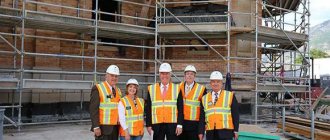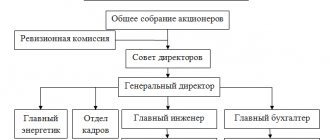Job Description for Production and Technical Department Engineer
[organizational and legal form, name of organization, enterprise]
[position, signature, full name of the manager or other official authorized to approve the job description]
[day month Year]
Job description of an engineer of the production and technical department [name of organization]
This job description has been developed and approved in accordance with the provisions of the Labor Code of the Russian Federation and other regulations governing labor relations.
General provisions
1.1. The engineer of the production and technical department belongs to the category of specialists and is directly subordinate to [name of the manager's position].
1.2. An engineer in the production and technical department is appointed to the position and dismissed from it by order of [name of position].
1.3. A person who has a higher professional (technical) education and work experience in a similar position for at least [value] years is accepted for the position of engineer of the production and technical department.
1.4. The production and technical department engineer must know:
— legislative and other regulatory legal acts regulating the production, economic and financial and economic activities of the organization;
— regulatory legal acts, other guidelines, methodological and regulatory materials of higher authorities relating to the technical preparation of production;
— profile, specialization and features of the organization’s structure;
— prospects for technical development and features of the organization’s (organization’s divisions) activities;
— basics of work technology;
— standards, technical specifications and other guidance materials for the development and execution of technical documentation;
— production technology and methods of conducting construction and installation work at construction sites;
— the procedure for developing and approving construction plans;
- building regulations;
— methods of carrying out technical and economic calculations using modern computer technology;
— the procedure for concluding and executing business contracts;
— basics of environmental legislation;
— basics of labor legislation;
— internal labor regulations;
— rules and regulations of labor protection, safety precautions, industrial sanitation and fire protection of construction sites.
Basic rights
Of course, when applying for a job, a person must have a clear understanding not only of his responsibilities, but also of his rights. Then he will have satisfying, productive work waiting for him.
A VET engineer under an employment contract has the following rights:
- To give him a job.
- On timely salary in full.
- To a safe workplace in terms of state labor protection standards.
- For professional training, advanced training in the manner established by law, and retraining in the relevant technical specialty.
- For rest, which, for example, includes a normal working day, weekly days off and paid annual leave.
- To create trade unions and join them in order to protect their rights, professional interests and freedoms.
- To resolve various labor disputes of a collective and individual nature, as well as to strike as provided for by law.
- For compulsory social insurance.
- To compensate for damage, including moral damage, which was caused as a result of the performance of professional duties, in the amount and manner established by law.
Job responsibilities
The production and technical department engineer is assigned the following job responsibilities:
2.1. Carrying out technical supervision of construction and installation works.
2.2. Ensuring that construction and installation work is completed within the approved time frame.
2.3. Participation in operational monitoring of construction progress, provision of technical documentation, equipment and materials.
2.4. Monitoring the implementation of mutual claims and requirements with subcontractors.
2.5. Study of the reasons causing delays and deterioration in the quality of construction and installation work.
2.6. Analysis of the organization’s activities for the previous planning period in order to identify opportunities for improving work and reducing costs for the construction of facilities and structures.
2.7. Participation in coordinating the actions and monitoring the work of subcontractors.
2.8. Checking estimate documentation for the construction of facilities, calculating costs, and accounting for work performed.
2.9. Checking the estimate documentation received from the customer and preparing opinions on its quality.
2.10. Development of estimate documentation for additional work.
2.11. Technical and economic analysis of documentation.
2.12. Analysis of technical decisions made in the process of construction and installation work.
2.13. Analysis of information received from contractors on the progress of construction and installation work.
2.14. Participation in resolving issues of making changes to project documentation in connection with the introduction of more advanced technological processes, space-planning and design solutions that ensure cost reduction and improvement of technical and economic indicators of construction and reconstruction projects.
2.15. Participation in the development of schedules for construction and installation work during the construction of facilities.
2.16. Solving technical issues regarding permitting documentation and during construction and installation work.
2.17. Participation in the work of commissions for the acceptance of construction projects and their commissioning.
2.18. Record keeping and documentation storage.
2.19. Providing methodological and practical assistance in the implementation of contracts.
2.20. Completion of as-built documentation in accordance with the established procedure.
2.21. [Other job responsibilities].
Purpose and objectives of the profession
Main goal
The work of an engineer - a specialist in the production and technical department of any industry will be to ensure the normal functioning of the main technological processes in the field of production and construction.
To do this you need to complete the following tasks
:
- knowledge of methodological and regulatory documents governing a specific area of activity;
- control over all areas of production in the fields of construction, energy, housing and communal services;
- interaction with specialists both within the company and outside it (customers of work, design institutes and subcontractors);
- work with design, executive and reporting, financial and technical documentation;
- ability to act in non-standard situations, analyze and eliminate possible errors in the performance of work.
If you have not yet registered an organization, then the easiest way is
This can be done using online services that will help you generate all the necessary documents for free: If you already have an organization and you are thinking about how to simplify and automate accounting and reporting, then the following online services will come to the rescue and will completely replace an accountant at your enterprise and will save a lot of money and time.
All reporting is generated automatically, signed electronically and sent automatically online. It is ideal for individual entrepreneurs or LLCs on the simplified tax system, UTII, PSN, TS, OSNO. Everything happens in a few clicks, without queues and stress. Try it and you will be surprised
how easy it has become!
Rights
An engineer of the production and technical department has the right:
3.1. For all social guarantees provided for by the legislation of the Russian Federation.
3.2. Receive information about the activities of the organization necessary to perform functional duties from all departments directly or through the immediate superior.
3.3. Submit proposals to management to improve your work and the work of the organization.
3.4. Get acquainted with draft orders of management relating to its activities.
3.5. Sign and endorse documents within your competence.
3.6. Take part in meetings where issues related to his work are discussed.
3.7. Require management to create normal conditions for the performance of official duties.
3.8. Improve your professional qualifications.
3.9. To other rights provided for by the labor legislation of the Russian Federation.
On the peculiarities of drawing up estimates and accepting work
The duties of the engineer are to carry out various calculations, as well as accept already completed production and construction work. He coordinates the estimate and cost calculation of the necessary equipment and materials between the project developer and the customer.
In addition, the technical equipment engineer takes part in the commission regarding the commissioning of the finished facility. He is also responsible for ensuring that preliminary estimates correspond to actual costs. If there is a need to attract additional investment or apply new types of work, the engineer carries out the necessary calculations with mandatory justification.
Responsibility
The production and technical department engineer is responsible for:
4.1. For non-fulfillment or improper fulfillment of the duties provided for in these instructions - within the limits determined by the labor legislation of the Russian Federation.
4.2. For offenses committed in the course of carrying out their activities - within the limits determined by the current administrative, criminal and civil legislation of the Russian Federation.
4.3. For causing material damage to the employer - within the limits determined by the current labor and civil legislation of the Russian Federation.
The job description has been developed in accordance with [name, number and date of document].
Job description of technical equipment engineer of a construction organization
It is no secret that during the construction and operation of any construction project, it is necessary to follow a huge number of instructions and rules. Despite the availability of these requirements, their simultaneous consideration is not an easy task.
This function is performed by a special service. For control purposes, the structure of construction organizations usually provides for the position of PTO engineer (stands for “production and technical department engineer”). The functions of a technical and technical equipment engineer are very diverse and require not only high professionalism and organizational skills, but also, often, strength of character and even courage.
Naturally, the diversity of production facilities and the conditions of their operation determines different responsibilities of such workers. In this article we will look at the typical content of a job description for a technical equipment engineer at a construction organization.
General provisions
Construction is almost always characterized by significant complexity and variety of work performed, which is sometimes carried out in extreme conditions. Decisions must be made quickly and mistakes must be corrected immediately. The production and technical department at large construction sites is a large structural unit, which is usually headed by a specialist with extensive experience working on various construction sites. However, the main backbone of the department is made up of ordinary engineers.
It is important to understand who a technical equipment engineer is. Many graduates of construction universities begin their careers as technical equipment engineers. Having encountered such a vacancy, sometimes young specialists do not know what they will do at a construction site. Therefore, first let’s look at the technical equipment engineer, what is it?
The answer to this question is contained in the “general requirements” section of the job description for an engineer in the production and technical department. A complete, but not exhaustive list of these requirements is given below in the example of such instructions. The main one is specialized or at least technical education.
This is understandable, since the employee will have to deal with technical documentation. In addition, constant contact with performers requires not only knowledge in the field of labor legislation and rules for safe work, fire safety equipment, but also certain personal qualities, for example, communication skills.
Knowledge of building codes and regulations - SNiPs - is important. Fluency in basic computer programs is not even discussed today. The VET engineer is organizationally subordinate directly to the head of the VET or (in large construction organizations) to the head of the sector or facility.
Rights and responsibilities of a technical and technical equipment engineer in construction
Typically, an ordinary VET employee works with ready-made project documentation, but he inevitably has to make adjustments to it, and, therefore, he must know how to prepare it, formalize it and coordinate it with the relevant structures within the enterprise and regulatory authorities.
Since there are a great many SNiPs in construction, usually a newly hired employee gets acquainted with them at the workplace (no one will be able to study all of them in detail at a university). These documents are “live” and the specialist must be aware of all their current changes. The responsibilities of the technical maintenance engineer also include working out the work schedule, as well as routine repairs of equipment.
Special and very responsible responsibilities lie in the area of control. For a technical equipment engineer, job responsibilities in terms of control and interaction with the customer are perhaps the most difficult task. He is obliged to analyze certificates for components and building materials, draw up reports of completed work, control the expenditure of funds, and prevent overspending.
The engineer of the production and technical department, in addition to the usual rights common to all employees, can temporarily stop the work if certain violations are detected during their execution.
Responsibilities
The job responsibilities of an engineer differ depending on his category. Based on the employee’s qualifications (education, experience, professional certificate), the range of his functional responsibilities is different, but if we generalize, the job responsibilities of a technical equipment engineer for a “dummie” boil down to the following:
- regulation of the activities of all departments in the company;
- work with estimates, technical documentation, projects;
- collection and analysis of information and development of projects on scientific and technical specialization;
- carrying out work on time, monitoring the quality of execution;
- testing new devices and describing operation and technical characteristics;
- preparation of technical and accounting documentation;
- drawing up reports on the completion of all work: initial, intermediate and final.
Example of a job description
Below is an example of a job description for a technical equipment engineer for a medium-sized construction organization.
General Director of JSC Akvastroy
____________________ Sinyakov M.M.
Job description of an engineer in the production and technical department General requirements
Persons who have a higher specialized education and know:
- composition and content of technical and design documentation, know how to correct and prepare it;
- the procedure for drawing up plans and scheduling work, as well as their acceptance and monitoring of implementation;
- basic technological methods for performing construction and installation work;
- basic safety, sanitation and fire safety techniques;
- basic economic knowledge as applied to the construction industry;
- rules for concluding contracts that provide effective control over their implementation.
Functional duties and responsibilities
The technical equipment engineer is obliged to:
- correctly maintain and modify all technical and organizational documentation that relates to the scope of activity of the production and technical department;
- perform supervisory functions and accompany the implementation of the entire scope of work;
- accept the finished work and ensure its compliance with the approved design and estimate documentation;
- monitor compliance with budget discipline and prevent contractors from unreasonably inflating the cost of work;
- timely and in full bring information about violations to the immediate superior;
- prepare estimate documentation for additional activities (work) and coordinate it with the relevant authorities;
- carry out routine checks of building materials and components for compliance with quality certificates and the requirements of state standards, take the necessary actions to prevent the use of low-quality materials;
- eliminate, within its competence, deviations from schedules and work plans;
- correctly draw up acts and materials to resolve disputes with subcontractors and contractors;
The PTO engineer is responsible for:
- the content of all documentation and the accuracy of the information in it;
- strict compliance with orders and instructions of management;
- failure to take measures regarding violations of design and estimate documentation, requirements for the safe conduct of work and fire safety measures.
The VET engineer has the right:
- work in conciliation commissions and make proposals to change design and estimate documentation;
- participate in the work of commissions for the commissioning of construction projects;
- temporarily stop the production process at the facility if gross violations of SNiPs are detected;
- request any technical or regulatory documentation that is necessary to perform his functional duties;
- give instructions to services in accordance with the structure of the enterprise.
A technical equipment engineer can be appointed or dismissed only on the basis of a special order from the general director of Akvastroy CJSC.
The working hours of production and technical department employees are determined by the Collective Agreement and internal regulations.
To travel to remote sites, the technical maintenance engineer is given a company car. Terms of use are determined by a separate order.
Features of work in various production areas
This position is in a construction company
requires a higher construction education and work experience of at least one year, and for complex objects up to three years.
Fulfilling the main responsibilities of an engineer in the production and technical department of this area involves comprehensive control over the implementation of construction and installation work. The specialist prepares and checks design documents, schedules and production plans, calculation and estimate documentation, as well as compliance of the work performed with approved norms and rules. In this industry, established interaction with customers, subcontractors, and design organizations is especially important.
Increased attention is paid to acceptance
objects and construction and installation works.
The work of a design engineer in the construction industry is discussed in the following video:
When selecting candidates for production and technical department engineers in the energy industry
Preference is given to those who already have experience in the relevant field. The specialist is required to have a higher or secondary vocational education and work experience in the specialty for at least three and five years, respectively.
Energy engineer performs duties
related to the control of electrical equipment, thermal and energy systems. The specialist must know the specifics of working with electrical equipment and its types, the rules for working with electrical circuits, and the skills of installing electrical equipment. The key responsibility here will be to ensure the operation and proper operation, repair and modernization of equipment in the power industry, electrical and thermal networks.
VET engineer in the housing and communal services system
You must have a secondary specialized or higher education in a technical profile, as well as work experience of at least one year.
The specialist performs
quite a wide range of responsibilities, since his area of responsibility includes both commissioned residential and non-residential buildings, communications, and new construction sites. He is responsible for the operation of heating networks and the operation of housing facilities that are on the balance sheet of the housing and communal services enterprise. This specialist is a member of commissions that analyze the technical condition of objects, interacts with specialists from design, supervisory, heat supply and other organizations, carries out certification of objects and monitors the database of common house metering devices.
VET engineer in the field of road construction
must have a professional education in the field of construction and operation of roads and work experience in the specialty of at least one year. He is required to know regulatory and technical literature, the fundamentals of technology and production, legislation in the field of road construction, methods of quality control and acceptance of work.
Additional skills may be useful
driving a car, knowledge of MS Office and Auto Cad programs.
The responsibilities of an engineer include the development of projects, technological maps and technological diagrams, their adjustment and coordination, maintaining various documentation, checking the completion of construction and installation work, compliance of their cost with volume and quality. The area of responsibility also includes checking the primary documentation of transport service providers. The most important task is to develop work schedules together with construction site managers, technical department employees, and project managers.
The production and technical department (PTO) engineer controls all production departments and is responsible for this. Such engineers are required in installation, road construction organizations, industrial and construction companies.
In this article we will dwell in detail on the main points that should be in the job description of a technical equipment engineer at a construction organization.
In accordance with current legislation, the job description must contain all the main points: general provisions, duties, responsibilities, rights. At its own discretion, the employer can supplement this document with other chapters - for example, on safety precautions, operating hours and interaction with other structures.
The design of the document is standard and consists of the company logo, the title of the document, the main text and the signature of both parties.
Since the VET engineer bears a large amount of responsibility, it is advisable to reflect in the general provisions:
- his education - it must be higher specialized or technical;
- personal qualities – responsibility, ability to make quick decisions independently;
- experience;
- necessary skills, in particular, monitoring interactions with customers and the expenditure of funds;
- knowledge of regulations and basic specialized rules, the so-called SNiPs;
- ability to draw up documentation taking into account innovations in regulations;
- knowledge of basic computer programs;
- ability to draw up and process work plans;
- knowledge of basic technological techniques for performing construction and installation work;
- knowledge of safety, sanitation and fire safety regulations.
In general terms, the employer must indicate all the requirements that he will impose on the employee in the future and indicate the exact criteria for selecting this official. In this case, all points must comply with the legislation of the Russian Federation.
Job responsibilities: what a technical equipment engineer is entitled to and his responsibilities
The technical maintenance engineer of a construction organization is tasked with:
- control of construction organization sites;
- contact with other employees and employees, as well as with contractors and customers;
- monitoring and analysis of the production situation;
- prompt elimination of shortcomings;
- maintaining strict timely reporting;
- accurate execution of technical and financial documents.
From these tasks, the responsibilities of a technical equipment engineer are formulated. They may include:
- planning;
- reporting;
- formation of design documents;
- acceptance of objects and preparation of related documentation;
- collecting documents for participation in the tender;
- tracking the timeliness of delivery of necessary materials and processing applications for them;
- drawing up acts, estimates, accounts;
- exercising complete control over the production process.
When drawing up such instructions, it is extremely important to understand that a technical maintenance engineer in a construction organization bears considerable responsibility for the quality of construction and timely delivery of the project. When shortcomings and errors appear, it is this senior official who must make quick, competent decisions to eliminate them. For example, during prolonged rains in a road construction organization, the engineer must agree on other deadlines for the completion of the project due to unforeseen situations and circumstances beyond the control of the company.
The technical equipment engineer must strictly follow all instructions from management and report problems and shortcomings in a timely manner.
Even when drawing up design and estimate documentation, the technical maintenance engineer must make additions to it that will ensure the safe conduct of construction work, fire safety measures and prevent the occurrence of negative unforeseen situations.
The reliability of documentation and accuracy of reporting during the construction of a facility depends on the technical and technical equipment engineer. Also, this official bears full responsibility for the timely delivery of construction materials and closely interacts with other construction organizations, customers, and contractors.
For failure to comply with the requirements specified in the job description, the employee may be held accountable, even criminally.
The job description of a construction company technical maintenance engineer must also specify the rights of this person.
In the process of performing his official duties, he has the right to maintain close contacts with employees of his enterprise - foremen, builders, auxiliary workers, etc., as well as to constantly contact the estimate and contract department and monitor the accuracy and timeliness of documents received for production. If necessary, the technical maintenance engineer can interact directly with the financial department, with security department employees and firefighters.
The VET engineer has the right to directly raise questions with management - the chief engineer, the director of the organization, the general director, and the founders.
In addition, the VET engineer has the right:
- be a member of the selection committee when the object is handed over;
- if gross violations are detected, stop the construction process until the errors are eliminated;
- in accordance with the production process, request any documents;
- give instructions to other services and departments - in accordance with production needs;
- use official modes of transport.
In addition, the rights of an official spell out his rights in accordance with the Constitution of the Russian Federation: to work, to rest, to a normal working day, to vacation.
Sample job descriptions for a technical and technical equipment engineer at a construction organization
Standard instructions
You can download an example of a standard instruction manual for a construction organization PTO engineer: https://yadi.sk/i/C-4-xVaY3Texm8
VET engineer - what is this profession?
A PTO engineer - stands for "production and technical department engineer" - is busy planning the production process, technical support, and other issues.
This is a specialist without whom no construction industry can do. Whether building pipelines in Siberia or modern flying houses in Japan, this is one of the most interesting, responsible and necessary professions. Employees of the technical and technical department participate in scientific research developments, draw up estimates, diagrams, calculations and all executive and technical documentation for the facility under construction.
By the way, if at a construction site they do not know the origin or purpose of a document, it is referred to the VET: the logic “they will always sort it out” applies.
We can say that the “legs” of other departments of the organization “grow” from the technical and technical department—budgeting and contractual, tender, technological, planning, etc. That is, in a microorganization there is always a technical department, then, as the functions of the production and technical department grow, they are allocated to other departments.
Conclusions (+ video)
The production and technical service of a construction company is engaged in the generation of documents necessary for each stage of construction. These materials are used to transfer to the verification commission and the customer himself. All calculations and analyzes attached to the acts form the basis of the final package of documents. The technical department is headed by a technical director, who can occupy the position of chief engineer of the company. Based on all of the above, we can conclude that every employee of this unit must have a higher education.
It is very important that each employee of the structure in question can replace his colleague . This factor helps improve the performance of the entire company. In addition, technical service employees must work closely with the accounting department in order to timely redirect financial flow.
https://youtu.be/oCSsSEx_YHs
Functions of a technical equipment engineer
What does a technical equipment engineer do? The functions and responsibilities of a technical equipment engineer are very diverse and depend on the specifics of the enterprise and industry. The functional responsibilities of a technical equipment engineer can be divided depending on the stage of construction:
— Stage 1 — preparation of production. After winning the tender, the organization begins preparing for construction - concluding a contract, obtaining a place to accommodate a construction camp and on-site warehouses, obtaining passes and relocating equipment and personnel, various approvals.
The job of a technical equipment engineer at this time is as follows:
- development and coordination with the Customer of permitting documentation for personnel, construction equipment, technologies, etc. This includes, for example, the creation of orders for persons responsible for the execution of work; Carrying out approval tests for electric welders - approval sheets are filled out, welded joints undergo non-destructive testing, as well as mechanical tests.
- development of technological maps for processes, work projects
- compilation and approval of a register of executive documentation
- obtaining permission from the Customer to construct the facility
- obtaining a positive expert opinion of design documentation
- preparation and transfer to Rostechnadzor of work production logs and OJR (for approval)
- signing contracts with subcontractors and suppliers
- often - registration of personnel for work, maintaining time sheets, other “turnover”
- but the most important thing is to receive and check for errors working and design documentation, PIC, bills of materials, specifications, questionnaires for equipment, calculations and estimates, etc. As a rule, the period for document verification is specified in the contract and is about 14 days.
— Stage 2 — construction support. During construction, the endurance and professionalism of a technical equipment engineer is demonstrated. This is the time of the most insane demands of the Customer, Technical Supervision, and other authorities. This is the time when construction deadlines are running out, supplies of materials are disrupted, and foremen are taken away in batches to cardiology. At this stage, it is important not to succumb to general panic, and continue to methodically do your craft:
- timely maintenance of executive documentation. This is the basis for technical maintenance; they will ask for this first of all, since without the as-built documentation properly executed and accepted by the customer’s services, the Customer will not pay for the scope of work. It's simple: no execution - no money - no more organization.
- construction project change management. In any construction process there are always deviations from the original design. Most often this happens due to the identification of design errors, replacement of design materials with similar ones, increase in the volume of work, etc. In case of any change, the PTO engineer writes a letter addressed to the Customer, who, in turn, contacts the Design Organization, which approves the changes.
- presentation of completed volumes of construction and installation work. Registration of acceptance and transfer of work occurs through KS-2, KS-3. Most often, these forms are prepared by estimators, while the line construction engineer signs them at the construction customer’s services.
— Stage 3 — delivery of the construction project. At this stage, everyone is counting the days until the end of construction and looking forward to a carefree vacation; the foremen begin to smile a little, putting the blood pressure monitors on the shelf. And the engineer of the production and technical department continues to perform his job functions:
- collection and delivery of the entire set of technical documentation for the facility - this includes permits, executive documents, equipment passports, certificates for materials, etc.
- preparation and signing of the acceptance certificate for the completed construction facility in the KS-11 form and the acceptance certificate for the completed construction facility by the acceptance committee KS-14.
The job responsibilities of a VET specialist are actually always broader - it all depends on qualifications, work experience, and category. For example, a leading technical engineering engineer can be involved in the selection of subcontractors and support of contractual work with them, correspondence with contractors and the customer; while a VET technician usually deals with the simplest things - filling out logs, drawing up reports, and routine work.
To put it simply, the technical supervision engineer draws up and signs with the Customer and Technical Supervision all work performed by foremen and foremen at the construction site. By the end of construction, all as-built documentation is stapled into folders and handed over.
The VET department in any organization is like a state within a state, it is an independent unit and reports only to its head, and at the same time, it constantly cooperates with all services and divisions.
In some small companies, the PTO also includes estimators (PTO engineer-estimator) involved in the preparation of estimates and pricing; in larger companies, as a rule, estimators are already listed in a separate (for example, estimate and contract) department.









